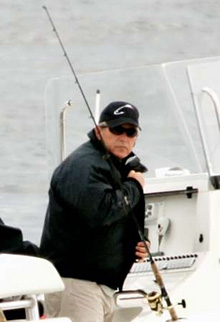 |
 |
 |
 Editorials | August 2006 Editorials | August 2006  
How to Look Like a Failure
 Sidney Blumenthal - The Guardian UK Sidney Blumenthal - The Guardian UK


| | U.S. President George W. Bush heads out to go fishing on a boat in Kennebunkport, Maine, August 25, 2006. (Reuters/Jim Young) |
By linking Iraq with the war on terror, Bush has created a dynamic that threatens to destroy him.

Each Bush presidency is unhappy in its own way. George W has contrived to do the opposite of his father, as if to provide evidence for a classic case of reaction formation. Rather than halt the army before Baghdad, he occupied the whole country. Rather than pursue a Middle East peace process that dragged along a recalcitrant Israeli government, he cast the process aside.

"Frustrated?" President Bush volunteered in his Monday press conference. "Sometimes I'm frustrated." His crankiness has deeper sources than having truncated his usual month-long summer vacation in Texas. "Rarely surprised," he continued, extolling his world-weary omniscience. "Sometimes I'm happy," he plunged on. "This is - but war is not a time of joy. These aren't joyous times."

Bush is trapped in a self-generated dynamic that eerily recalls the centrifugal forces that spun apart his father's presidency. It was not until the Gulf war that the public became convinced that the elder Bush was a strong leader and not the "wimp" stereotypically depicted. Then came a recession. Bush's feeble response was not seen as merely an expression of typical Republican policy, but as a profound character flaw. If Bush was strong, why didn't he solve the problem?

The younger Bush's staggering mismanagement of the Iraqi occupation has until recently served his purpose of seeming to defy the elements of chaos he himself has aroused. By stringing every threat together into an immense plot that justifies a global war on terrorism, however, he has ultimately made himself hostage to any part of the convoluted storyline that goes haywire.

Having told the public that Iraq is central to a war on terror, the worse things go in Iraq, the more the public thinks the war on terror goes badly. Asked at his press conference what invading Iraq had to do with September 11, Bush seemed so dumbfounded that at first he answered directly. "Nothing," he said, before sliding into a falsely aggrieved self-defence: "Except for it's part of - and nobody has ever suggested in this administration that Saddam Hussein ordered the attack."

Asked about sectarian violence in Iraq, Bush's voice suddenly went passive. "You know, I hear a lot of talk about civil war." Indeed, he might have heard it from his top generals, John Abizaid and Peter Pace, who, seriously off-message from Bush's PR campaign of relentlessly stressing "victory", testified before the Senate on August 3, as Abizaid said: "Sectarian violence is probably as bad as I have seen it."

All the stopgap strategies have failed to halt it eliminating Zarqawi, the civil action teams, building up the police, concentrating forces in Baghdad. Asked three times what his strategy is, or whether he has a new one, Bush tried to fend off the question with words like "dreams" and "democratic society". "That's the strategy," he said. Then Bush confused having a strategy with being in Iraq. "Now, if you say, are you going to change your strategic objective," he struggled to explain, "it means you're leaving before the mission is complete."

Perhaps Bush's bizarre summer reading, according to his press office, of Camus's The Stranger, is responsible for his melange of absurdities, appeal to existential threat, and erratic point of view, veering from aggressor to passive observer. Would a staff aide have the audacity to suggest that he read Strategy, BH Liddell Hart's military classic? "Self-exhaustion in war," writes Hart, "has killed more states than any foreign assailant." It was a lesson in restraint the father understood when he stopped short of Baghdad.

Sidney Blumenthal is a former senior adviser to President Clinton; his new book, How Bush Rules: Chronicles of a Radical Regime, is published next month. | 
 | |
 |



